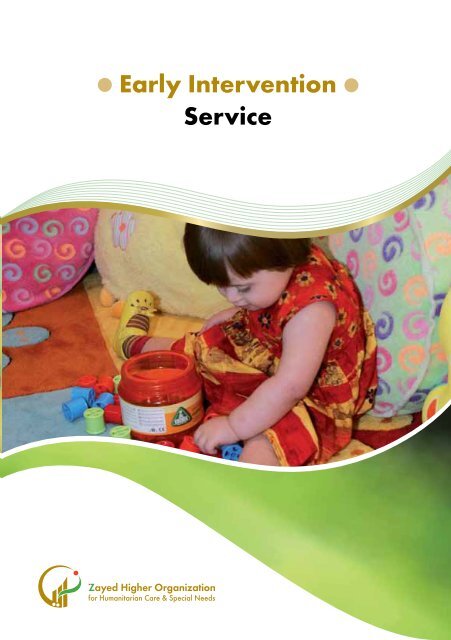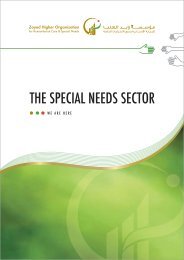Early Intervention Service
Early Intervention Service
Early Intervention Service
Create successful ePaper yourself
Turn your PDF publications into a flip-book with our unique Google optimized e-Paper software.
<strong>Early</strong> <strong>Intervention</strong><br />
<strong>Service</strong>
H.H. Sheikh Khalifa Bin Zayed Al Nahyan<br />
President of the UAE
Introduction<br />
Zayed Higher Organization for Humanitarian Care recognizes the importance of a<br />
child’s early years as a period of rapid growth and development. For children with<br />
disabilities, this time period is particularly critical. Therefore, Zayed Higher Organization<br />
for Humanitarian Care has given special attention to offer early intervention services for<br />
children with special needs with all types and levels of disabilities.<br />
These early intervention educational and therapeutic services enhance a child’s ability to<br />
benefit from future educational services provided within the school-age programs. Since<br />
no early intervention services existed in the Emirate of Abu Dhabi, it was imperative for<br />
the Zayed Higher Organization for Humanitarian Care to develop this service.<br />
<strong>Early</strong> intervention services are delivered at two <strong>Early</strong> <strong>Intervention</strong> centers: one in Abu<br />
Dhabi Center for Care and Rehabilitation / Mafraq and one at Al-Ain Center for Care<br />
and Rehabilitation / Falaj Hazzaa.<br />
www.zho.ae<br />
4<br />
5
The <strong>Early</strong> <strong>Intervention</strong> Unit provides its specialized services to<br />
children with special needs from 8:00 am until 3:00 pm from<br />
Sunday to Thursday, except public holidays in the country. As a<br />
part of its social mission to support the broader community, ZHO<br />
also provides its early intervention services to some non-citizens<br />
from the community.<br />
Individuals with special needs and legal legislations in the<br />
United Arab Emirates<br />
The following national laws provide the legal foundation for <strong>Early</strong> <strong>Intervention</strong> <strong>Service</strong>s<br />
here in the UAE:<br />
Article 2 of Federal Law No. 29 of 2006 addresses the rights of individuals with special<br />
needs and ensures the rights of the person with special needs to have access to all<br />
services based on their abilities and potential. In addition, the law assures that having<br />
a disability may not be a reason to prevent the person from having the same rights as<br />
all citizens to access health care and social services and to participate in economic,<br />
educational, professional, cultural and recreational activities. Item D of Article 9 of the<br />
same law, states that the families of students with special needs will be trained in ways<br />
and methods of caring for, teaching and supporting their children.<br />
Item B of Article 11 refers to the development of programs for early diagnosis, intervention,<br />
community awareness, health education and the methods of early intervention and<br />
specialization in the field of special needs. Article 14 of the same law, emphasizes the<br />
importance of providing the academic disciplines for the purpose of preparing those<br />
who work with people with special needs and their families in the area of diagnosis and<br />
early intervention.<br />
6<br />
7
Research Supporting <strong>Early</strong> <strong>Intervention</strong> <strong>Service</strong>s<br />
Objectives of The <strong>Early</strong> <strong>Intervention</strong> <strong>Service</strong><br />
<strong>Early</strong> <strong>Intervention</strong> refers to the actions and practices aimed at addressing the various<br />
challenges presented by children with special needs. Families have a special focus in<br />
<strong>Early</strong> <strong>Intervention</strong> programs and receive support and assistance to meet their child’s<br />
needs within the home. Over 50 years of research, both quantitative and qualitative<br />
supports the impact of <strong>Early</strong> <strong>Intervention</strong> programs on both the children and their<br />
families being served.<br />
The <strong>Early</strong> intervention Program is considered as an educational, therapeutic service<br />
system, provided for young children who have special educational and developmental<br />
needs from birth until the age of six years, and those who are at risk of disability for<br />
many reasons. The <strong>Early</strong> <strong>Intervention</strong> Program is delivered in both the home which is the<br />
familiar environment of the child and at the <strong>Early</strong> <strong>Intervention</strong> Center where specialized<br />
equipment is available. The objectives of the program include:<br />
• <strong>Early</strong> <strong>Intervention</strong> services lead directly to improvements in the development of<br />
communication, motor, social and cognitive skills as measured by standardized<br />
assessments and developmental scales.<br />
• Families report improvements in the quality of life for all family members as they learn<br />
how to care for their child with a disability. They report less personal stress and a more<br />
positive attitude about the future for their children.<br />
• <strong>Early</strong> <strong>Intervention</strong> often results in children needing fewer services later in life.<br />
• Children receiving <strong>Early</strong> <strong>Intervention</strong> are more likely to transition directly to mainstream<br />
schools and avoid special education programs altogether.<br />
• <strong>Early</strong> <strong>Intervention</strong> is cost effective as the amount needed for future services is reduced.<br />
• Parents can be effective teachers for their children with special needs when given the<br />
necessary knowledge, resources, and support.<br />
• Highly structured programs are likely to be more effective; that is, those with specific<br />
goals for the child’s program, ongoing assessment of progress, the intensity and<br />
frequency of services, and have a strong family component.<br />
• To achieve direct involvement of parents in the process of teaching their child.<br />
• To provide the parents with the continuous training so that they acquire the necessary<br />
knowledge to understand their child’s disability and appropriate interventions.<br />
• To provide the child with access to recommended therapy interventions and instruction<br />
provided by occupational, physical, and speech therapists.<br />
8<br />
9
<strong>Service</strong>s provided at the <strong>Early</strong> <strong>Intervention</strong> Unit<br />
The <strong>Early</strong> <strong>Intervention</strong> Program offers a range of specialized services for<br />
children with special needs:<br />
First: Portage Program <strong>Service</strong><br />
The Portage Program is a developmental guide for families that includes specific<br />
activities which caregivers can use with their children to teach selected skills. Usually,<br />
the program holds training sessions once or more during the week, where the Portage<br />
specialist models the educational activities in the presence of parents.<br />
The Portage program contains a total of 450 methodological cards, covering the sensory<br />
skills, daily life skills, language development, physical and cognitive development in the<br />
first six years of age.<br />
Second: Pre-Academic and Entry Skills<br />
The <strong>Early</strong> <strong>Intervention</strong> teacher will identify the entry or baseline skills so that she<br />
can set the educational objectives in a sequential order. Skills include such things as<br />
knowing how to count to 5, making associations between items (a toothbrush goes with<br />
toothpastes) or knowing basic concepts like “big and little”.<br />
10<br />
11
Third: Professional Coordination with Diagnostic and<br />
Assessment Unit<br />
The Diagnostic and Assessment Unit provides the initial evaluation of the child including<br />
the collection of medical or educational documents. This initial evaluation is a requirement<br />
before placement can be made into the early intervention unit. The diagnostic unit<br />
provides initial assessment for motor, communication, cognitive, and social development<br />
as well as screening for visual or auditory levels.<br />
Fourth: Professional Coordination with Therapy Section to<br />
Receive Speech, Physical and Occupational Therapy<br />
The <strong>Early</strong> <strong>Intervention</strong> Unit coordinates with the Therapy Department in the Center,<br />
related to the provision of speech, physical and occupational therapy services according<br />
to the child’s identified needs.<br />
Physical Therapy is designed to develop gross motor skills of children, such as sitting,<br />
standing and walking. Sometimes, the use of specialized equipment or a corrective<br />
device is needed to meet the child’s needs; such as, the use of a wheelchair.<br />
Occupational Therapy is designed to help students with their fine motor skills (e.g. ability<br />
to write) and with their ability to complete daily tasks like eating, using the toilet, or<br />
dressing.<br />
Speech Therapy is provided to children who are having difficulty developing speech<br />
or communication skills. Therapy may focus on the production of speech, the ability to<br />
produce language/sentences or the use of alternative communication systems.<br />
12<br />
13
Fifth: Family Counseling <strong>Service</strong><br />
Recognizing that the child’s disability not only influences the child, but affects all<br />
members of his family on varying degrees, the <strong>Early</strong> <strong>Intervention</strong> Program provides<br />
family counseling services. This service helps family members to understand the meaning<br />
of disability for their child, its potential effects on the life of the child as well as give them<br />
strategies to help them cope with the problems and pressures of raising a child with a<br />
disability. An important outcome of this service is to achieve family stability.<br />
14<br />
15
Contact Details<br />
أرقام التواصل<br />
Name of the Center هاتف Tel<br />
فاكس Fax اسم المركز +971 2 6985555<br />
+971 2 6985610<br />
The Special Needs Sector<br />
+971 2 6985614<br />
+971 2 6985750<br />
Abu Dhabi Center for Care and Rehabilitaion<br />
+971 2 6985751<br />
+971 2 6985780<br />
Abu Dhabi Center for Autism<br />
+971 2 6985782<br />
+971 2 6985480<br />
+971 3 6985900<br />
Al Ain Center for Care and Rehabilitation<br />
+971 3 6985901<br />
971+ 2 4472062<br />
قطاع ذوي االحتياجات الخاصة - المكتب الرئيسي 971+ 2 5822366<br />
مركز ابو ظبي لرعاية وتأهيل ذوي االحتياجات الخاصة 971+ 2 5822068<br />
مركز ابو ظبي للتوحد 971+ 3 7820086<br />
مركز العين لرعاية وتأهيل ذوي االحتياجات الخاصة مركز القوع لرعاية وتأهيل ذوي االحتياجات الخاصة +971 3 7356995 7356342 +971 3 Rehabilitation Al Qooa Center for Care and<br />
Madinat Zayed Center for Care and Rehabilitation<br />
+971 2 6985822<br />
+971 2 6985828<br />
Ghayathi Center for Care and Rehabilitation<br />
+971 2 6985880<br />
+971 2 8741415<br />
Al Sela Center for Care and Rehabilitation<br />
+971 2 6985700<br />
+971 2 6985724<br />
+971 2 6985800<br />
Delma Center for Care and Rehabilitation<br />
+971 2 6985801<br />
+971 2 8783099<br />
Blind Printing Press<br />
+971 2 6985677<br />
+971 2 6985688<br />
Zayed Agricultural Center for Rehabilitaiona and Development<br />
+971 2 6985771<br />
+971 2 6985776<br />
971+ 2 8847473<br />
مركز مدينة زايد لرعاية وتأهيل ذوي االحتياجات الخاصة 971+ 2 8741268<br />
مركز غياثي لرعاية وتأهيل ذوي االحتياجات الخاصة 971+ 2 8724014<br />
مركز السلع لرعاية وتأهيل ذوي االحتياجات الخاصة 971+ 2 8783077<br />
مركز دلما لرعاية وتأهيل ذوي االحتياجات الخاصة مطبعة المكفوفين +971 2 4472061<br />
مركز زايد الزراعي للتأهيل والتنمية 971+ 2 5835358<br />
Needs Abu Dhabi Sport Club for Special<br />
5582884 +971 2 +971 2 5583288 نادي ابو ظبي لذوي االحتياجات الخاصة Needs Al Ain sport Club for Special<br />
7820990 +971 3 +971 3 7810770 نادي العين للمعاقين 16<br />
17



